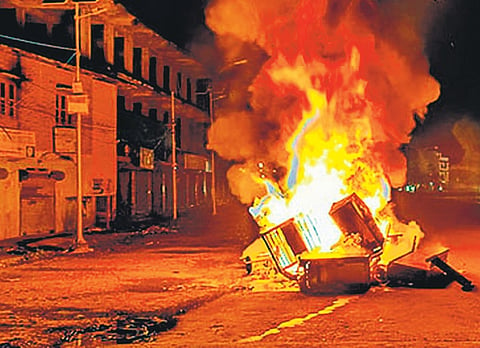

The apathy towards whatever is happening in the Northeast seems to be the traditional policy of the Indian government, irrespective of who is in power. The region’s sense of alienation because of history, culture and ethnicity remains. The Northeast is not a national priority. The heat is not felt in Delhi when the Northeast burns.
The ethnic violence that broke out on May 3, 2023 is still going on, and it is periodically flaring up. The casualty of 10 caused by the CRPF while retaliating against a full-fledged attack on their camp this November 11 using sophisticated weapons including rocket launchers has resulted in questions being raised of the central forces’ impartiality and integrity.
But the state forces have come under attack too. The state police’s alleged inaction during the initial days of the conflict in May 2023 resulted in loots of the police armoury. At that time, there was a clamour for deploying central forces.
Manipur, with over 35 communities inhabiting the valleys and hills, has a history of violence and deadly clashes. Ethnic tensions and a long history of mutual suspicion turned into open conflict between Meiteis and Kuki-Zos soon after the March 27, 2023 high court order recommending scheduled tribe status to Meiteis. The drive to evict tribal villagers from reserved forests left hundreds of Kuki-Zo people homeless as stand-by arrangements were not available despite the Kuki People’s Alliance being a part of ruling dispensation.
This is not to say Meitei claims are entirely not genuine. They form 52 percent of the state’s population, but are restricted to 10 percent geographical area in the Imphal valley. While the Kuki-Zo and other tribes could shift from the hills to the valley, Meiteis cannot relocate themselves to the hills. About 90 percent of the state is occupied or accessible to Nagas and Kukis. The Meiteis believe their rather recently acquired Hindu identity is proving to be a liability, depriving them of eligibility to access more areas of the state.
They conveniently forget that settlement in Imphal valley has placed them disproportionately ahead of the hill people in political and administrative clout.
The very same Meiteis sought to protect themselves from the Mongoloid identity, rejected Bengali script and even tried to revoke their old Meitei religion, Senamahi. They formed several insurgent groups such as the People’s Liberation Army-Manipur, with bases in East Pakistan (Bangladesh) and Burma (Myanmar). They also protested against mayangs (outsiders), including Manipuri Muslims called pangals.
After the liberation of Bangladesh in 1971 and Manipur becoming a full state in 1973, protracted military ops coupled with political negotiations brought about a high level of integration. But the trust deficit propelled by a hasty implementation of land acts unaccompanied by matching rehabilitation and the controversial 2023 high court order have put the clock back to the days of insurgency. The existence of a double-engine government has only added to the lack of trust and cast communal aspersion on an otherwise purely ethnic issue.
Violence is not new to Manipur, but this time it is not directed against arms of the Union, but is being staged between two major ethnic groups. The initial inertia in tackling the violence resulted in large-scale looting of police weapons by Meiteis, worsening the situation. Then the Kukis followed suit in the hilly areas.
Much of the Northeast was little explored and little understood even for a while after India’s independence—and various kinds of strife continued in the region. But there was a time that followed when the years of insurgency and violence seemed to be behind us. While terrorism and left-wing violence was spreading its tentacles elsewhere in the country, the Northeast was rather peaceful. Its people discovered their essential unity with the country that has been their home.
But now, further delays in taking effective steps can again prove costly. Mere military and routine administrative steps would not be adequate. The prime minister not visiting Manipur and his long silence on the matter have been highlighted not only by the opposition but also the media.
A visit by the prime minister may be only a symbolic gesture. But gestures have great significance in a democracy. The sensitivity of the people of the Northeast, particularly the tribals, will have to be taken into account. The perceived discrimination and apathy would only compound the sense of alienation resurfacing in several parts of the Northeast.
Before it is too late, the Centre must intervene. The kidnapping and killing must stop. The resolute retaliation of the CRPF was unavoidable as otherwise, more weapons would have gone into the hands of insurgents. It was really a war-like situation, considering the type of weapons used and severity of attack.
While this type of resolute action is unavoidable, the government must give deserving priority to rehabilitation and relief work, too. Battle fatigue among the insurgents may not set in soon, considering the region’s long history. Proactive administrative steps and preemptive operational strikes must continue. The legacy of lethargy in dealing with the Northeast must go.
K V Madhusudhanan
Former Inspector General of CRPF, Northeastern sector
(Views are personal)